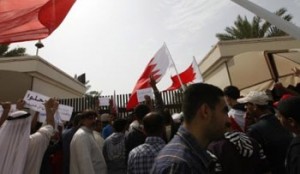The fast-forward events of political discourse in Bahrain that were rushing towards October 31 have come to an unexpected halt. Just as the countdown reached single digits to the release of an independent commission’s report that would detail in depth who did what in the street protests earlier this year the commission said hang on.
It was the pause heard around the island and around the region. No other Arab nation that experienced any kind of street protests this year had invited independent outsiders to come in and examine what happened. All sides were anxiously awaiting the findings: those opposed to the government, to say “see we told you so;” government officials who expect the commission to candidly show where some of the protestors were heinous; and the vast majority of Bahrainis who believe in their country and who seek a fuller understanding of what caused the scar Bahrain now seeks to heal.
The reason for the pause: so many people talked to the commission, in such detail, that the commission did not have enough time to meet the October 31 deadline sought by Bahrain’s King when he invited the commission to form and do its work.
So now the release is planned for November 23, a few days from now.
Anti-government forces were so eager for the report and its “recommendations” — even thought the commission is to report only factual findings and not “recommendations” — that it denounced early reports of the delay as paid government propaganda. Some even started attacking the credibility of some commission members. The government – braced for strong criticism — was equally surprised. It sees the pause as a chance to further plan its next steps after the report — that of constructing measures to address some of what the commission documents.
Already, the government has begun taking judicial steps against some who used excessive force against protestors. It has not been reported, but underscores the efforts of some in the government to make good on promises of reform.
That said, the governemnt remains stagnant, as if unable to change the way it acts or thinks.
Thus the pause shines new light on the current shifting dynamic and the evolving irony of the political situation in Bahrain. While the government’s long term impetus to take any dramatic action is clearly triggered by the reality of what the commission will find, the dynamic for change has already been seized by several newly elected members of the Bahrain parliament. They, of course, only had the opportunity to run and win because the opposition resigned their 18 seats in the spring, refused to run in the September by-elections and took steps to torpedo the voting.
Suddenly, a parliament maligned as weak and powerless has seized the reins of reform. That is a development that caught many by surprise.
Another surprise was the just concluded visit by U.S. congressmen. Hostile and skeptical before arriving in Bahrain, the congressmen met with opposition members, independents, newly elected members of the parliament, government leaders and members of the Royal family — and members of the independent commission. They left Bahrain with a broader understand of what occurred in February and March, the attempts at reform then and the nuances of the realpolitik on the island. In short, they took long walks in that gray area of reality.
A third surprise was some new parliament members forming the Bahrain Bloc — the first ever legislative coalition of Sunni and Shia members. That groundbreaking step shocked many in Bahrain. It came as the parliament started seriously pursuing some of the recommendations that emerged from the National Dialogue — a process also boycotted by opponents and then mocked for its results. Even unbiased observers of Bahrain were skeptical of the Dialogue’s worth. By contrast, these new members see those recommendations as a starting point.
In response, five anti-government groups declared they also sought democratic reforms and not an overthrow of the government — a change in words if not philosophy. They adopted the same language as the Bahrain Bloc, calling for an independent legislature and an elected government. These changes track proposals from the National Dialogue and almost precisely match earlier proposals by Crown Prince Sheikh Salman bin Hamad al-Khalifa. He had suggested, on March 13, having a parliament with full authority, a government that “represents the will of the people,” and fair voting districts. The leaders of the same groups now declaring support for those ideas had rebuffed his efforts in March.
The common belief is the commission’s findings will show meticulous, determined efforts by the Prince to offer political reforms far beyond the initial demands of those first protestors.
The pause meant that all sides had to exhale for a few more weeks before once again holding their breaths to await the verdict. The repositioning on all sides is continuing until the next release date is announced.
Now, the countdown is back to single digits — and this time there is no second delay likely.
Tom Squitieri is a freelance journalist who works on press freedom issues and media awareness with the Bahrain government.







